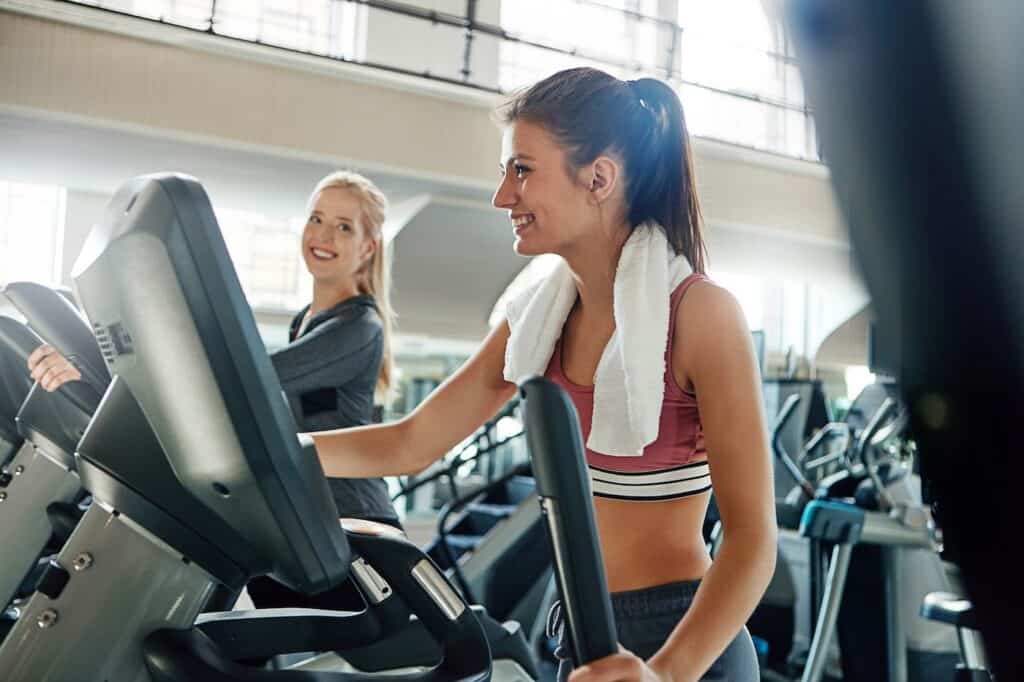Why Does The Stair Stepper Make Me Sweat So Much?
Most humans are no stranger to a bit of sweat, particularly when it comes to working out. It’s not uncommon for us to work up a healthy sheen when we raise our heart rate and get the muscles pumping.
But why does the stair stepper make you sweat so much? If you find yourself sweating a lot on the stair stepper, it could be due to you working your muscles harder than with other workouts. It could also be to do with the temperature and humidity of the room. There may also be factors such as exercising indoors rather than outside that are playing a part.
Today, we’ll be having a think about what makes us work up a sweat, and why the stair stepper might prove to be a particularly sweaty machine for some people!
Why Do We Sweat?
Why do we start shedding water every time we workout? Well, sweating is a healthy and necessary method our body has evolved to keep us cool and safe.
When we exercise on the stair stepper, our glutes and thighs work harder and our body starts to generate heat. All this extra activity and energy means that our core temperature is likely to rise. If our core body temperature spikes or drops too much, it can be dangerous. Fortunately, our bodies have evolved effective ways of keeping the thermostat steady!
One of the primary ways humans cool down is through sweat. Sensors alert our brain to the fact that our body temperature is rising, at which point the brain signals to allow water to be passed through our pores and onto our skin.
Heat from our skin is then transferred into the water droplets as they evaporate off, resulting in heat being diverted from our core. The more we need to cool down, the harder we’re likely to sweat. This is why more intense workouts tend to result in sweatier bodies.
What is Making Me Sweat So Much on the Stair Stepper?
There are a number of factors that can influence how much we sweat on any given piece of kit and on any given day.
With the stair stepper, you may find that the range of motion causes a higher rise in body temperature than other workouts focusing only on a few select muscles. For some people, working out the legs and trying to burn belly fat might not be familiar.
It may also be that you are used to working out outside. If you are an outdoor runner or cyclist, a great deal of your cooling down will have been done by wind. You might not have mother nature’s fan when you’re working out on an stair stepper indoors!

Similarly, the humidity of the room can also be a huge factor in how much you sweat. In more humid environments, sweat on your skin is going to evaporate at a slower rate. This means that your body has to produce more sweat in order to get the same cool off effect.
Genetic factors also affect the rate at which different people sweat. Older people tend to sweat less and men, on average, sweat more than women.
It also seems that athletes and other people accustomed to working out regularly can start to sweat more readily during workouts, even though their fitness may be much higher. This appears to have something to do with the body having become more responsive to exercise sessions as well as becoming more efficient at generating the water the body needs to keep itself cool.
What to do if I am sweating lots on the stair stepper
Unless there has been a sudden, dramatic change in your sweat rate, it’s likely not something to be worried about. If you feel dizzy, nauseous, or in pain when you are exercising, this is a sign that something’s not right. In such cases, stop your stair stepper use and consult a medical professional.
Otherwise, not sweating at all during hard exercise is often a more worrying sign than sweating a lot. The former can mean you are dehydrated, whereas the latter shows that your body is at least equipped to try to cool off. Make sure you are drinking plenty of fluids to replace the water lost through perspiration.
If you are worried about excessive sweating, either on or off the stair stepper, it may be worth consulting a medical professional. There are some medical conditions, as well as medications, that can cause regular, excessive sweating. There are treatments available, as well as over the counter products such as antiperspirants and sweat shields, that can help.
An ex-triathlete, fitness coach and writer with a Masters in Sports Physiology. Fitness is my passion and I've had my fair share of home fitness equipment tried and tested!


2 Comments